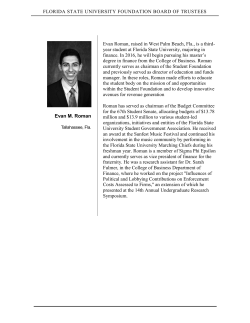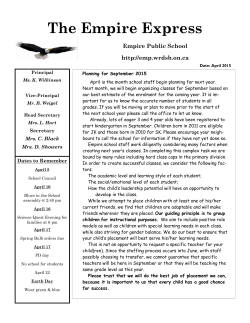
Fall 2015 1 HIST 585-002: Special Topics in History: Topic: The
Fall 2015 HIST 585-002: Special Topics in History: Topic: The Later Roman Empire (OPUS title) The Later Roman Empire: Law, Religion, and Society (complete course title) Instructor Evans-Grubbs Day(s) TH Time(s) 4:15 – 7:15 pm Maximum Enrollment 12 Semester Description: This course explores the political, social, religious and legal changes in the late Roman world (c. 300-c.600, roughly from the reign of Diocletian through the break-up of the western Empire). The precise parameters of the course and the topics covered will depend on the background and interests of the students enrolled, but will include the great codifications of Roman law (particularly the Theodosian Code), the disintegration of the western half of the Empire into regional, "barbarian" states, the question of “ethnicity,” the “Christianization” of the Empire, and changes in private life and gender roles. A reading knowledge of Latin is recommended but not required; ability to read current scholarship in French or German also helpful. Required Textbooks, Articles, and Resources: Readings may include but are not limited to: 1. Peter Brown, The Cult of the Saints (1981). 2. Peter Brown, Through the Eye of a Needle: Wealth, the Fall of Rome and the Making of Christianity in the West 350-550 AD (2012). 3. Patrick Geary, The Myth of Nations (2002). 4. Jill Harries, Law and Empire in Late Antiquity (1999). 5. Bryan Ward-Perkins, The Fall of Rome and the End of Civilization (2005). Also articles in: The Blackwell Companion to Late Antiquity (ed. Philip Rousseau, 2009); The Oxford Handbook of Late Antiquity (ed. Scott F. Johnson, 2012); and other collections; recent articles in the journals Late Antiquity; L'Antiquité tardive, Early Medieval Europe; and the Journal of Early Christian Studies; and readings in ancient sources in translation. Grading: There will be a midterm paper of 10-15 pages researching and analyzing laws from the Theodosian Code, and a final paper of c. 20 pages researching the “state of the question” of some current issue in late Roman/late antique studies. 1 Fall 2015 In addition, students will send in short email responses to the readings and do short oral presentations on topics relevant to their own interests. Auditors: Official auditors for this class are expected to do the readings and participate in class, and to send in the short weekly email responses. Auditors do not have to do the midterm or final paper. They are encouraged to do at least one oral presentation. 2
© Copyright 2025





















